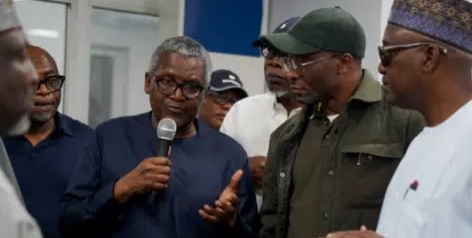
Dangote fights back, debunks substandard products claim at his refinery
Africa’s richest man, Aliko Dangote, has faulted claims that petroleum products from his refinery are substandard.
Only two days ago, Farouk Ahmed, the Chief Executive Officer of the Nigerian Midstream and Downstream Petroleum Regulatory Authority, NMDPRA, had said that the quality of petroleum products from the Dangote refinery, as well as those from Watersmith, Aradel, and other modular refineries, is inferior compared to imported ones.
Indeed, Dangote said this is far from the truth, as his products meet the global quality standard.
Dangote spoke on Saturday when the leadership of the House of Representatives visited and toured the refinery located at the Lekki Free Trade Zone in Lagos.
House of Representatives Speaker, Tajudeen Abbas, and his deputy, Benjamin Kalu, led the delegation from the House which included Hon. Ikenga Ugochinyere.
To test the verasity of his claim, Dangote and his team tested diesel bought from two filling stations and that from his refinery at the refinery’s laboratories.
The tested diesel from other stations was bought in the presence of the lawmakers, while that from the Dangote Refinery was taken from production also in the presence of the lawmakers.
Two tests were conducted; a test of the sulphur level and a flash test. While all crude-based products contain some level of sulphur, high sulphur levels cause damage to engines and vehicle components.
The results showed that the sulphur content in the diesel from other stations was above 2,631 and 1,829; much higher than the recommended level while the tests for the flash point showed results of 26 and 63 respectively for the diesel from other stations. Both results fell short of the recommended minimum of 66.
The results for the diesel from Dangote turned out to be 87.6 ppm for sulphur and 96 flashpoints.
For Dangote, the result does not only show the reality of products from his refinery, but it also shows that substandard petroleum products are being imported into the country and sold to unsuspecting Nigerians.
He said, “The most important thing, your excellency, is to note that the imported one they are encouraging, is the spec in test, but in certain cases when you check (independently), different results will show.”
This, he said, is “because those people who have the lab have been told what to write.”
He said the best way to determine the quality of products being imported and sold to Nigerians is by going to the filling stations, buying and testing them.
Speaker Abbas said going by the presentation and the contradictory claims, there was a need for an investigation.
“I don’t know how we have this contradiction of two players representing the public and private sector.
“I think it is something we need to investigate further to find out if there are ulterior motives,” he said.
